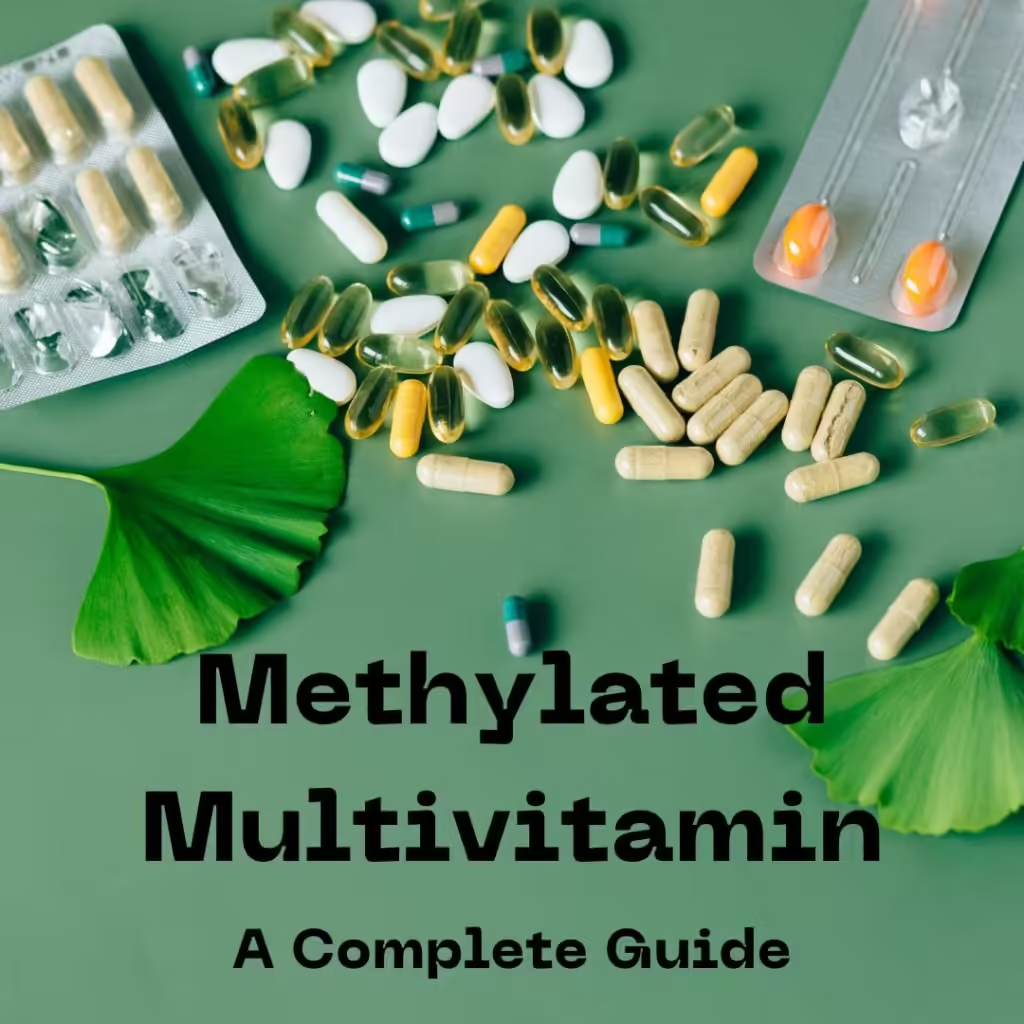Methylated multivitamins are specially formulated supplements designed to enhance nutrient absorption and support overall health. Unlike standard multivitamins, methylated versions contain nutrients in their bioactive forms, such as methylcobalamin (B12) and methylfolate (B9). This makes them particularly beneficial for individuals with certain genetic variations that affect how their bodies process vitamins. By providing essential vitamins and minerals in their most accessible forms, methylated multivitamins can help:
- Optimize energy levels
- Support brain function, and
- Promote overall well-being.
In this post, we’ll explore the benefits of methylated multivitamins and how they can play a vital role in your daily health regimen.
What is a Methylated Multivitamin?
Methylated multivitamins are supplements that contain bioavailable forms of certain vitamins, especially B vitamins. “Methylation” refers to a biochemical process that occurs in your body and helps activate essential vitamins and enzymes. For some people, particularly those with genetic variations like MTHFR gene mutations, non-methylated forms of certain vitamins (like folic acid or B12) aren’t well-absorbed or utilized. MTHFR gene mutations significantly impair the body’s ability to utilize non-methylated vitamins, particularly affecting folate metabolism and homocysteine levels. The MTHFR enzyme is crucial for converting homocysteine to methionine, and mutations such as C677T and A1298C lead to reduced enzyme activity. Which results in elevated homocysteine levels and associated health risks (Yano et al., 2004)(Levin & Varga, 2016).
- Folic acid and vitamin B12 are critical in managing homocysteine levels in MTHFR mutant individuals (Şahin et al., 2016).
- Adequate folate intake is essential for mitigating the effects of MTHFR mutations (Şahin et al., 2016).
Methylated multivitamins ensure these individuals can benefit from nutrients without relying on their bodies to convert them into their active forms.
Why Methylation Matters
Methylation is a vital biochemical process that involves the addition of a methyl group (one carbon atom and three hydrogen atoms) to various molecules in the body, including DNA, proteins, and lipids. This process plays several critical roles in maintaining health:
- DNA Regulation
- Methylation helps regulate gene expression by adding methyl groups to DNA. This can turn genes on or off, influencing how cells function and develop. Proper methylation is essential for maintaining healthy cellular processes and preventing abnormal cell growth (Meng et. al., 2015).
- Detoxification
- Methylation is involved in detoxifying harmful substances in the body. It helps convert toxins into more water-soluble forms that can be easily excreted. This process is crucial for eliminating heavy metals, drugs, and environmental pollutants. Inorganic arsenic is converted to methylarsonic acid (MMA) and dimethylarsinic acid (DMA), which are less toxic and more readily eliminated via urine, reducing toxicity (Vahter & Concha, 2001).
- Neurotransmitter Production
- Methylation supports the synthesis of neurotransmitters, which are chemicals that transmit signals in the brain. This includes the production of serotonin, dopamine, and norepinephrine, all of which are vital for mood regulation, cognitive function, and overall mental health (Bottiglieri et al., 1994).
- Homocysteine Regulation
- Methylation plays a key role in converting homocysteine, an amino acid linked to cardiovascular disease, into methionine. Elevated homocysteine levels are associated with an increased risk of heart problems, making efficient methylation essential for cardiovascular health (Hanners, 2022).
- Hormonal Balance
- Methylation helps regulate hormone levels in the body, including estrogen. Proper methylation can influence hormone metabolism, potentially reducing the risk of hormone-related issues such as certain cancers (Bruschi, 2020).
-
Genetic Variations
- Some individuals have genetic variations (e.g., MTHFR mutations) that affect their ability to methylate efficiently. Understanding and supporting methylation in these individuals can help prevent health issues associated with impaired methylation pathways.
What is the Best Vitamin for Methylation?
Methylation is a crucial biochemical process that affects various bodily functions, including DNA synthesis, detoxification, and neurotransmitter production. Certain vitamins play essential roles in this process, with the following being among the best for supporting methylation:
- Vitamin B12 (Methylcobalamin)
- Methylcobalamin is the active form of vitamin B12. It is vital for the conversion of homocysteine to methionine, an amino acid involved in methylation. B12 deficiency can lead to elevated homocysteine levels, which are linked to various health risks, including cardiovascular diseases (Hanners, 2022).
- Folate (Methylfolate)
- Methylfolate is the bioactive form of folate (vitamin B9). It is essential for the synthesis of nucleotides, which are necessary for DNA replication and repair. Methylfolate is crucial for proper methylation, especially for individuals with genetic variations affecting folate metabolism, such as MTHFR mutations. MTHFR deficiency can cause hypomethylation of DNA, affecting gene regulation and potentially leading to reproductive issues across generations (Karahan et al., 2021).
- Vitamin B6 (Pyridoxal 5′-Phosphate)
- This active form of vitamin B6 is important for amino acid metabolism and the production of neurotransmitters. It also plays a role in converting homocysteine to cysteine, helping to regulate levels of this amino acid in the body.
- Betaine
- While not a vitamin, betaine (trimethylglycine) supports methylation by donating methyl groups in the conversion of homocysteine to methionine. It can be particularly beneficial for individuals with impaired methylation pathways.
Vitamin B12 and methylfolate, both of these methylated vitamins help ensure proper methylation and overall health, especially for individuals with impaired methylation.
FAQs
Are Methylated Multivitamins Better Than Normal Multivitamins?
Methylated multivitamins can be more beneficial than regular multivitamins for certain individuals. For those who have trouble processing vitamins due to genetic mutations (like MTHFR), these supplements provide nutrients in their already active forms. This means the body can absorb and use them more efficiently.
For others without methylation issues, the difference may be less significant, but methylated vitamins can still offer better absorption overall, potentially enhancing their health benefits.
What is methylated B12?
Methylated B12, also known as methylcobalamin, is a form of vitamin B12 that is biologically active in the human body. Unlike other forms of B12, such as cyanocobalamin, methylcobalamin does not require conversion to be utilized by the body. It plays a crucial role in various physiological processes, including:
- Methylation: Methylcobalamin is involved in the methylation process, which is vital for DNA synthesis, repair, and regulation.
- Nerve Health: It supports neurological function and is essential for the maintenance of healthy nerve cells.
- Red Blood Cell Formation: Methylated B12 aids in the production of red blood cells, preventing anemia.
- Homocysteine Regulation: It helps convert homocysteine into methionine, thereby reducing levels of this amino acid, which is associated with cardiovascular diseases when elevated.
Are Methylated Multivitamins Good for You?
Yes, methylated multivitamins are beneficial, especially for people who have difficulty absorbing regular forms of vitamins like B12 or folic acid. They help ensure your body can process and use these nutrients effectively, supporting energy, cognitive function, and overall health.
Who Should Not Take Methylated Vitamins?
People who do not have issues with methylation may not necessarily need methylated vitamins. Additionally, those with certain health conditions should consult with a healthcare professional before taking methylated vitamins, as excessive intake can cause side effects like nervousness or overstimulation.
How Do I Know if I Need Methylated Vitamins?
If you experience symptoms like chronic fatigue, or brain fog, or have a known MTHFR gene mutation, you might benefit from methylated vitamins. Consulting a healthcare professional and possibly undergoing genetic testing can help determine whether methylated supplements are right for you.
Conclusion
Methylated multivitamins offer a unique approach to nutrition by providing active forms of essential vitamins. For individuals with specific genetic conditions or absorption issues, they can make a significant difference in maintaining optimal health. Whether or not they are right for you depends on your unique nutritional needs and health status.
Thank you for reading, for more interesting articles visit our homepage.



